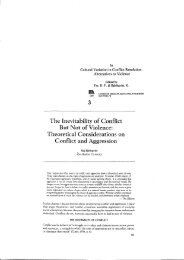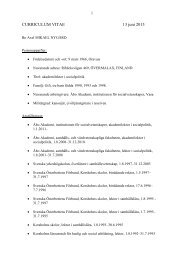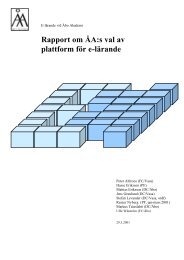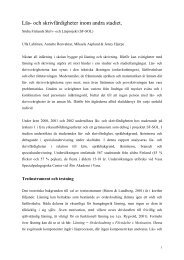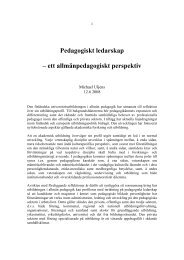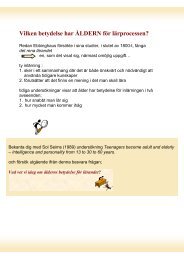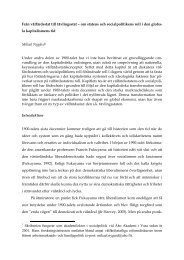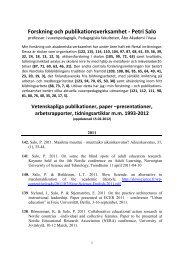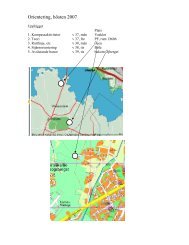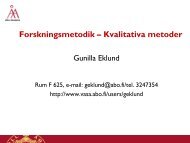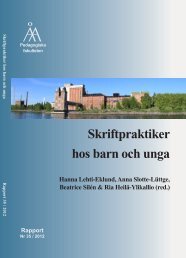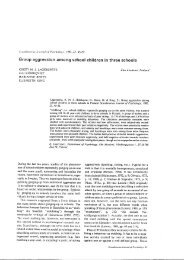Parties, Candidates and Citizens On-Line - Åbo Akademi
Parties, Candidates and Citizens On-Line - Åbo Akademi
Parties, Candidates and Citizens On-Line - Åbo Akademi
Create successful ePaper yourself
Turn your PDF publications into a flip-book with our unique Google optimized e-Paper software.
perspective, the articles have been concerned with the relative strengths of different<br />
political actors in the on-line political environment as described in the theories of<br />
normalization <strong>and</strong> equalization (Margolis & Resnick 2000, 53-76). The order of<br />
presentation in this section is structured according to the empirical research questions.<br />
The findings of the individual articles are, however, mainly summarized <strong>and</strong> discussed<br />
with reference to the theories of normalization <strong>and</strong> equalization.<br />
2.1.1 The on-line political actors in Finl<strong>and</strong><br />
Three of the thesis’ articles, numbered two, three <strong>and</strong> four, have provided an assessment<br />
of the Finnish parties’ <strong>and</strong> c<strong>and</strong>idates’ on-line presence. The political activity on-line of a<br />
wide array of different political actors – i.e. parties, c<strong>and</strong>idates, NGOs, the news media,<br />
government, labour unions, web portals, business organizations, citizens, educational<br />
organizations – prior to the 2004 election for European Parliament was examined in the<br />
second article (Carlson & Str<strong>and</strong>berg 2005). The article gave a broad overview of the<br />
political actors dimension. As for the question of who the political actors of the Finnish<br />
on-line political environment are, this study provided a rather clear cut answer: the<br />
traditional off-line political actors, i.e. political parties <strong>and</strong> c<strong>and</strong>idates, made up the bulk of<br />
the electoral web sphere. These were followed by governmental- <strong>and</strong> media websites. The<br />
noticeable focus on parties <strong>and</strong> c<strong>and</strong>idates in this thesis thus appears valid as they<br />
apparently are the dominating Finnish on-line political actors in terms of having websites.<br />
The third <strong>and</strong> fourth articles (Str<strong>and</strong>berg 2006a; 2007) further scrutinized the web<br />
presence of the Finnish parties prior to the 2006 presidential election <strong>and</strong> the c<strong>and</strong>idates<br />
prior to the 2003 Parliamentary election. These studies revealed findings quite similar to<br />
the second article in regards to “who” the on-line political actors in Finl<strong>and</strong> are. Firstly, all<br />
major <strong>and</strong> minor Finnish parties have party websites while several fringe parties lack<br />
websites. Secondly, the dominance of the major parties is also replicated in terms of the<br />
web presence of the Finnish c<strong>and</strong>idates. A larger share of the major party c<strong>and</strong>idates were<br />
on-line than those of minor <strong>and</strong> fringe parties. Belonging to a major party was likewise<br />
the strongest predictor of c<strong>and</strong>idate web presence when entered as one of several<br />
predictors in a logistic regression model. Both of these empirical observations lend<br />
support to the normalization theory. The major parties, <strong>and</strong> their c<strong>and</strong>idates, have a<br />
dominant presence in the on-line political environment in Finl<strong>and</strong>.<br />
In summary, concerning who the on-line political actors in Finl<strong>and</strong> are, the current<br />
on-line political environment in Finl<strong>and</strong> is seemingly dominated by traditional political<br />
actors, i.e. the parties <strong>and</strong> c<strong>and</strong>idates. Among these, there is a noticeable dominance by<br />
the larger parties <strong>and</strong> their c<strong>and</strong>idates. This influence of the major traditional political<br />
actors is interesting, seeing as Finl<strong>and</strong> has several contextual circumstances which could<br />
171



